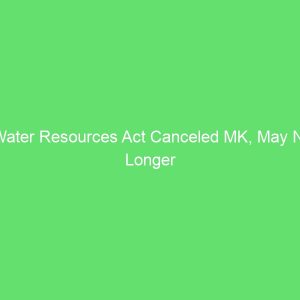JAKARTA. Good news came in mid-February 2015. The Constitutional Court (MK) cancel the overall validity of the Act (Act) No. 7 of 2004 on Water Resources (SDA), on Wednesday (18/02) at the Plenary Court, Jakarta. Based on the decision No. 85 / PUU-XII / 2013, which was read by Chief Justice Arief Hidayat Act No.7 of 2004 does not meet the six basic principles of water resources management restrictions.
In the main petition, the applicant (PP Muhammadiyah, Vanaprastha Association and several individual applicant) explained that there were irregularities against the judgment of the Constitutional Court in the case verdict 58-59-60-63 / PUU-II / 2004 and case 8 / PUU-III / 2005, regarding of Act No. 7/2004 on Water Resources. Diversion norms that tend to affect the implementation of privatization and commercialization opportunities are detrimental to society. Since the issuance of PP 16/2005 on Development of Water Supply System (PP SPAM), further confirms the strong role of the private sector in water management. In fact, the Act SDA asserted, SPAM development is the responsibility of the central government / local government, so the organizers are State-Owned Enterprises (SOE) / Regional Owned Enterprises (enterprises). Right to Use Water in Water Resources Act is only enjoyed by managers who take away from the water source, not the consumer who enjoys the water ready for use that have been distributed.
Quoted from the official website of the Constitutional Court, in a decision No. 058-059-060-063 / PUU-II / 2004 and No. 008 / PUU-III / 2005, the Court stated that the water resources as part of the rights, resources contained in the water also needed people to meet other needs, such as for agricultural irrigation, power generation, and for industrial use, which has contributed significantly to the advancement of human life and is an important factor also for humans to be able to live in dignity. Assurance that the state still retains its control over water rights it is a requirement that can not be eliminated in assessing the constitutionality of the Act SDA. This guarantee is seen in the six basic principles of water resources management restrictions. These six basic principles, namely the users of water resources to meet the basic needs of everyday people and to agriculture not be charged for water resources management services, throughout the fulfillment of basic needs of daily and for the agricultural community above were obtained directly from the water source.
In addition, the concept of Right to Use Water in Water Resources Act shall be construed as derivatives (derivatives) of the right to life guaranteed by the 1945 Constitution, therefore, the use of water outside of Right to Use Water, in this case the leasehold Water, must be through the application permission from the Government that publication should be based on a pattern that engages community participation widest. Therefore, leasehold Water should not be intended as granting control of water sources, rivers, lakes, or swamps.
“Thus, the private sector should not be controlling the source of water or water resources but can only exploits the specific amount or allocation in accordance with the allocation specified in the permit granted by the state strictly,” said Constitutional Justice Aswanto.
Related to the principle of “beneficiaries water resources management services required to bear the costs of management” should be interpreted as a principle that does not put the water as an object to be subject to economic price. Thus, there is no calculation of the price of water as a component of amounts to be paid by beneficiaries. In addition, these principles should be flexible by not wearing the same calculation without considering the wide utilization of water resources.
“Therefore, farmers water users, users of water for agricultural purposes are exempted from the obligation to pay for people’s water resource management services,” said Aswanto.
In response to this, the Chairman of the Indonesian Farmers Union (SPI) Henry Saragih expressed, for these farmers a very strategic decision because it would eliminate private rights for exploitation that has proven over water robs farmers and proven caused conflict in many places , began in Klaten, Central Java, Bogor, Padarincang Banten, and other places.
“With this ruling that private companies immediately stop the exploitation of water and return water to the people and the state, not private enterprise IT, especially foreign private,” he said on the field this afternoon (20/02).
Henry added, the decision of this Court will restore the government to the water management for irrigation and drinking water.
“We farmers are also grateful to the Muhammadiyah, Al-Washliyah, organizations and other parties who have demanded SDA Act relating to the lives of these people,” he added.
Resourches: http://www.spi.or.id/?p=7649

Comments are closed